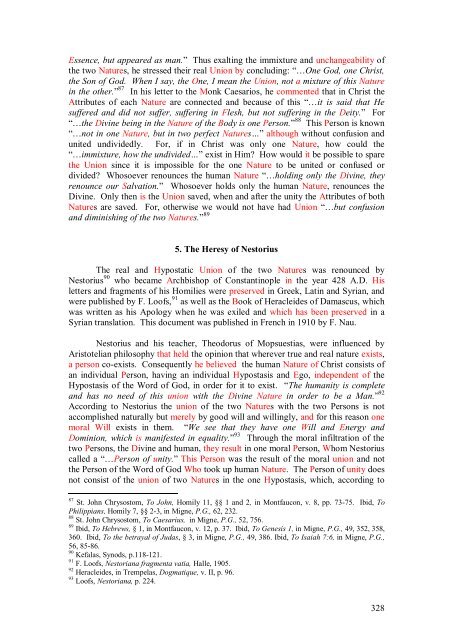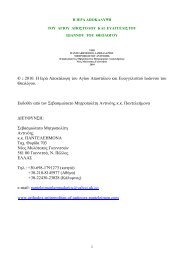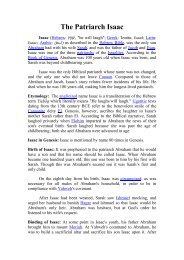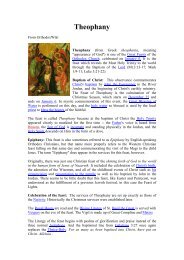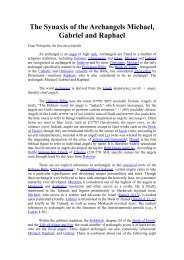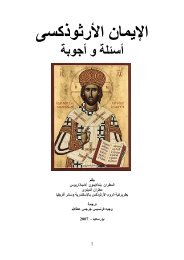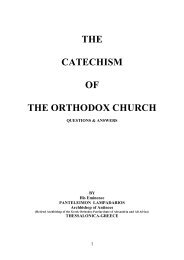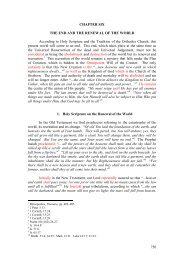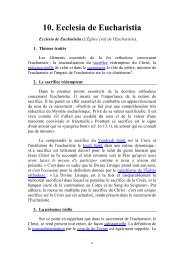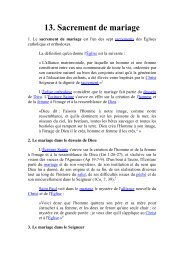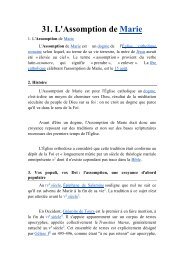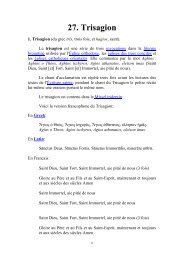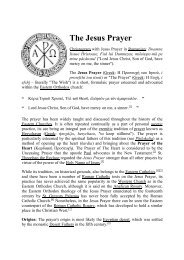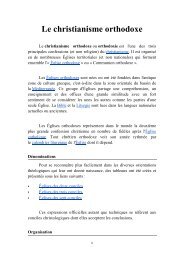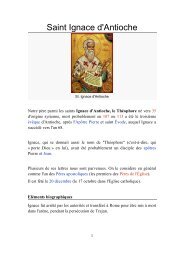028 part 3 chapter 6 the hypostatic union - Orthodox-mitropolitan-of ...
028 part 3 chapter 6 the hypostatic union - Orthodox-mitropolitan-of ...
028 part 3 chapter 6 the hypostatic union - Orthodox-mitropolitan-of ...
You also want an ePaper? Increase the reach of your titles
YUMPU automatically turns print PDFs into web optimized ePapers that Google loves.
Essence, but appeared as man.” Thus exalting <strong>the</strong> immixture and unchangeability <strong>of</strong><br />
<strong>the</strong> two Natures, he stressed <strong>the</strong>ir real Union by concluding: “…One God, one Christ,<br />
<strong>the</strong> Son <strong>of</strong> God. When I say, <strong>the</strong> One, I mean <strong>the</strong> Union, not a mixture <strong>of</strong> this Nature<br />
in <strong>the</strong> o<strong>the</strong>r.” 87 In his letter to <strong>the</strong> Monk Caesarios, he commented that in Christ <strong>the</strong><br />
Attributes <strong>of</strong> each Nature are connected and because <strong>of</strong> this “…it is said that He<br />
suffered and did not suffer, suffering in Flesh, but not suffering in <strong>the</strong> Deity.” For<br />
“…<strong>the</strong> Divine being in <strong>the</strong> Nature <strong>of</strong> <strong>the</strong> Body is one Person.” 88 This Person is known<br />
“…not in one Nature, but in two perfect Natures…” although without confusion and<br />
united undividedly. For, if in Christ was only one Nature, how could <strong>the</strong><br />
“…immixture, how <strong>the</strong> undivided…” exist in Him? How would it be possible to spare<br />
<strong>the</strong> Union since it is impossible for <strong>the</strong> one Nature to be united or confused or<br />
divided? Whosoever renounces <strong>the</strong> human Nature “…holding only <strong>the</strong> Divine, <strong>the</strong>y<br />
renounce our Salvation.” Whosoever holds only <strong>the</strong> human Nature, renounces <strong>the</strong><br />
Divine. Only <strong>the</strong>n is <strong>the</strong> Union saved, when and after <strong>the</strong> unity <strong>the</strong> Attributes <strong>of</strong> both<br />
Natures are saved. For, o<strong>the</strong>rwise we would not have had Union “…but confusion<br />
and diminishing <strong>of</strong> <strong>the</strong> two Natures.” 89<br />
5. The Heresy <strong>of</strong> Nestorius<br />
The real and Hypostatic Union <strong>of</strong> <strong>the</strong> two Natures was renounced by<br />
Nestorius 90 who became Archbishop <strong>of</strong> Constantinople in <strong>the</strong> year 428 A.D. His<br />
letters and fragments <strong>of</strong> his Homilies were preserved in Greek, Latin and Syrian, and<br />
were published by F. Lo<strong>of</strong>s, 91 as well as <strong>the</strong> Book <strong>of</strong> Heracleides <strong>of</strong> Damascus, which<br />
was written as his Apology when he was exiled and which has been preserved in a<br />
Syrian translation. This document was published in French in 1910 by F. Nau.<br />
Nestorius and his teacher, Theodorus <strong>of</strong> Mopsuestias, were influenced by<br />
Aristotelian philosophy that held <strong>the</strong> opinion that wherever true and real nature exists,<br />
a person co-exists. Consequently he believed <strong>the</strong> human Nature <strong>of</strong> Christ consists <strong>of</strong><br />
an individual Person, having an individual Hypostasis and Ego, independent <strong>of</strong> <strong>the</strong><br />
Hypostasis <strong>of</strong> <strong>the</strong> Word <strong>of</strong> God, in order for it to exist. “The humanity is complete<br />
and has no need <strong>of</strong> this <strong>union</strong> with <strong>the</strong> Divine Nature in order to be a Man.” 92<br />
According to Nestorius <strong>the</strong> <strong>union</strong> <strong>of</strong> <strong>the</strong> two Natures with <strong>the</strong> two Persons is not<br />
accomplished naturally but merely by good will and willingly, and for this reason one<br />
moral Will exists in <strong>the</strong>m. “We see that <strong>the</strong>y have one Will and Energy and<br />
Dominion, which is manifested in equality.” 93 Through <strong>the</strong> moral infiltration <strong>of</strong> <strong>the</strong><br />
two Persons, <strong>the</strong> Divine and human, <strong>the</strong>y result in one moral Person, Whom Nestorius<br />
called a “…Person <strong>of</strong> unity.” This Person was <strong>the</strong> result <strong>of</strong> <strong>the</strong> moral <strong>union</strong> and not<br />
<strong>the</strong> Person <strong>of</strong> <strong>the</strong> Word <strong>of</strong> God Who took up human Nature. The Person <strong>of</strong> unity does<br />
not consist <strong>of</strong> <strong>the</strong> <strong>union</strong> <strong>of</strong> two Natures in <strong>the</strong> one Hypostasis, which, according to<br />
87 St. John Chrysostom, To John, Homily 11, §§ 1 and 2, in Montfaucon, v. 8, pp. 73-75. Ibid, To<br />
Philippians, Homily 7, §§ 2-3, in Migne, P.G., 62, 232.<br />
88 St. John Chrysostom, To Caesarius, in Migne, P.G., 52, 756.<br />
89 Ibid, To Hebrews, § 1, in Montfaucon, v. 12, p. 37. Ibid, To Genesis 1, in Migne, P.G., 49, 352, 358,<br />
360. Ibid, To <strong>the</strong> betrayal <strong>of</strong> Judas, § 3, in Migne, P.G., 49, 386. Ibid, To Isaiah 7:6, in Migne, P.G.,<br />
56, 85-86.<br />
90 Kefalas, Synods, p.118-121.<br />
91 F. Lo<strong>of</strong>s, Nestoriana fragmenta vatia, Halle, 1905.<br />
92 Heracleides, in Trempelas, Dogmatique, v. II, p. 96.<br />
93 Lo<strong>of</strong>s, Nestoriana, p. 224.<br />
328


